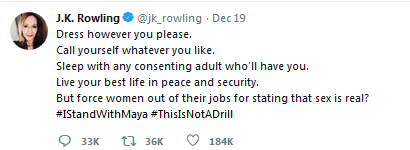 t might be said that the level of sophistication of a civilization is measured
by how it talks about sex. A hundred years ago, Sigmund Freud created a scandal
by suggesting that sexual frustration was causing psychosomatic problems. Before
that, scientists created an even bigger scandal by noting that even plants
have sex, and that there are two sexes in plants. Even the Bible affirms that
there is such a thing as sex, though it does not necessarily approve of it.
t might be said that the level of sophistication of a civilization is measured
by how it talks about sex. A hundred years ago, Sigmund Freud created a scandal
by suggesting that sexual frustration was causing psychosomatic problems. Before
that, scientists created an even bigger scandal by noting that even plants
have sex, and that there are two sexes in plants. Even the Bible affirms that
there is such a thing as sex, though it does not necessarily approve of it.
If the discovery that there are two sexes marks the high point of a civilization, then erasing that knowledge must be considered as a downturn. Certainly it is inconvenient for those among the young who had hoped someday to try it out.

Male and female crows socializing
But the existence of sex has somehow turned controversial, as author J.K. Rowling discovered, so scientists now must keep their mouths shut on this burning question, lest they incur the wrath of the D&I bureaucrats, or lest those powerful bureaucrats in charge of handing out property stickers take offense and start slow-walking the process of cataloging the bar codes on the departmental Xerox machines.
The same is not true for editors of scientific journals. Editors of science magazines like Science, Nature, and The Lancet openly and vocally take sides in highly charged issues like sexual inequality and climate studies. This indicates to potential authors that dissenting opinions on vital issues of public interest are unwelcome. In turn, it calls into question the scientific objectivity and integrity of the journals and, by extension, the scientists who do publish in them.

J K Rowling's controversial tweet (Dec 19, 2019)
Exhibit A: a special issue of the December 2018 volume (vol.48, issue 12) of the Journal of Autism and Developmental Disorders tries to link autism (which is now called neurodiversity) and gender diversity into a single intersectional movement. The editor's summary set the tone: it assumes that ‘gender’ is a synonym for sex, that a person's sex is ‘assigned at birth,’ and that gender diversity and neurodiversity are tightly linked.
This isn't just politically correct goofiness. JADD is a mainstream science journal. The claims that men can be women and that sex is assigned at birth are what Carl Sagan used to call extraordinary claims. Anyone wanting to make such a claim would have to demonstrate that pouring sex hormones into a body can change its genetic makeup, rather than stating it as if it were a proven fact. I suspect that such a demonstration would be received with a certain amount of skepticism. Any journal editor who allows such tendentious arguments into its pages needs to decide whether they're running a science journal or a political one. These days there is no middle ground: a claim is either political or scientific; it cannot be both.
Some JADD authors responded with the sort of psychobabble one might expect: a typical title was “Trajectories and Perspectives of Autistic Transgender and Gender-Diverse Adolescents.” But most seemed more interested in their own sinecures: one paper says that 87.4 percent of hfASD (high-functioning autism spectrum disorder) individuals suffer from gelotophobia, which is the fear of being laughed at.** Another evaluated the effectiveness of BFRC, which stands for bedtime fading and response cost, a strategy used by parents to get ASD children to sleep. The rest seemed to be scrambling to think of something related to the topic so they could have a paper to publish.
The term ‘neurological diversity’, aka ‘neurodiversity’, is no longer just a politically correct euphemism for autism spectrum disorder. It is morphing into an advocacy movement whose new goal is to neutralize the concept of neurological impairment altogether. If it succeeds, it will discourage research into causes and possible treatments as scientists come to regard autism spectrum disorders as toxic—too risky to be worth studying—as happened with gender dysphoria.
Also, this gelotophobia seems like a trait that those denying the existence of sex might wish to cultivate.
Exhibit B: Way back in the dark ages of 2017, the editors of Scientific American published an article claiming that “a pair of chromosomes do not always suffice to distinguish girl/boy—either from the standpoint of sex (biological traits) or of gender (social identity).” They put forward the theory that a new form of genetic mosaicism unique to the brain means that the human brain is always part male and part female.
Needless to say, that's not quite how that works. Granted, Sci Am is not a science journal, and it may have a feeble grasp of science—I dropped my subscription two decades ago after encountering more unscientific rubbish than I could take—but many laymen believe it represents how scientists think.
No doubt it is loads of fun for editors to pontificate on fashionable political issues. They may see nothing wrong with commissioning a special issue and selecting authors to present articles on the side of the issue that they agree with. But these are violations of good scholarly practice. Indeed, in this age of GLP, GCP, and GMP,* it might be a good time to insist on GSP, if that's what it takes, to protect our confidence that papers containing dissenting results won't get spiked.
In the so-called “real world” outside of science, there is a deep concern that social activists are trying to redefine basic biological terms for political gain. If editors of scientific journals encourage this, either out of pandering or shared belief, they will undermine one of the core pillars of science: that our views are, at base, non-political and dispassionate. It will convince people that our conclusions, whatever they may be, are predetermined by our political views. If that happens, the status of science as an authority on factual matters will be destroyed. It is that serious, and it is happening now. The recent book Scientocracy shows what the reaction to it will look like.
Biologists are already reluctant to take stand on contentious issues involving sex, gender identity, and equality, knowing their university will not support them should activists take offense. If editors pile on, it gives ideology a toehold in science. The effects will percolate through all fields of science and funding and publication will be seen as mere expressions of political views.
Like it or not, biology, climate studies, and now neurology are being conscripted into political battles. Unless scientists can defend their right to study and publish what the evidence dictates, we will eventually be forced to face the fact that we are no longer scientists, but unwilling lysenkoists.
As for the question of whether there is such a thing as biological sex, I'm going to go out on a limb and say maybe.
Of course I was kidding in that last paragraph. No matter how much anyone may wish it otherwise, sex is genetically determined, binary, and unchangeable. This is not a political opinion. It's a scientific fact (see here for details). This is so uncontroversial in science that it's hardly worth mentioning.
This really belongs in a different essay, but let's do a thought experiment. We take a person and implant a fake tail on his back. We graft dog fur all over him, sharpen his incisors, paint his nose black. He makes barking noises. Is he a dog or a person made up to look like a dog?
Monty Python did a skit about a CIA agent named Teddy Salad who was such a master of disguises that he looked exactly like a dog. He had all his head apart from the eyes and brain removed to fit into his dog costume. But no matter how much he may resemble a dog, even if the UK government puts canis lupus familiaris on his driver's license, does that make him a dog? If someone claims to be a dog, chews on bones and chases cats, does that make him a dog? Does the fact that people get upset and angry and punish us if we say he's not a dog make him a dog? Perhaps we need to relax and think a bit more about these questions. What is it that makes us what we are?
We all lie from time to time to spare people's feelings. And heaven knows I like lying to people as much as anybody. But there have to be limits. You might get me to say “Nice doggie” once in a while to stop him from barking, but I'm never going to pet him.
* GLP = Good Laboratory Practice, GCP = Good Clinical Practice, GMP = Good Manufacturing Practice, and GSP = Good Scholarly Practice
** Not to be confused with gelatophobia, which is fear of ice cream
dec 21 2019, 7:56 am. last edited dec 22 2019 11:06 am
